Firm Dynamics and Employment Outcomes
In a market economy, firm foundations and closures are important drivers of resource (re)allocation, structural change, and economic development which is particularly important with respect to the economic transformation of East Germany from a state-directed to a market economy. At the same time, job displacement coming along with structural change may have serious consequences for affected employees, such as unemployment, earnings losses, or lower job quality in a new job. This research group uses microeconometric methods to analyze foundation, evolution, and failure of firms, the amount and quality of jobs created by new firms and the consequences of firm closures for employees, in particular in terms of labor market outcomes such as employment and wages.
Research Cluster
Productivity and InstitutionsYour contact

Mitglied - Department Structural Change and Productivity
EXTERNAL FUNDING
01.2020 ‐ 06.2024
The Rise of Populist Parties in Europe: The Dark Side of Globalization and Technological Change?
VolkswagenStiftung
Globalisation may have increased prosperity in general, but has also led to unemployment, wage inequality, outward migration and, thus, ageing populations in many European regions. This project examines whether these economic burdens lead to votes for populist parties.
01.2019 ‐ 06.2022
MICROPROD („Raising EU Productivity: Lessons from Improved Micro Data“)
European Commission
The goal of MICROPROD is to contribute to a greater understanding of the challenges brought about in Europe by the fourth industrial revolution and the associated ‘productivity puzzle’ in a context of globalisation and digitisation, and to provide alternative policy options to better address these challenges.
This project has received funding from the European Union’s Horizon 2020 research and innovation programme under grant agreement No 764810.
07.2018 ‐ 12.2020
Firm Wage Differentials in Imperfect Labour Markets: The Role of Market Power and Industrial Relations in Rent Splitting between Workers and Firms
German Research Foundation (DFG)
The main purpose of this proposal is to grasp a firmer understanding of how employment rents are split between workers and employers in imperfect labour markets and how labour market institutions, such as unions and works councils, influence the distribution of rents. In that it not only promises new insights into the wage formation process and the likely consequences of important labour market trends like falling unionisation and worker codetermination, but also promises to inform important public policy debates, such as which rights should be granted to organised labour.
02.2019 ‐ 09.2019
Evaluation of the IAB Establishment Panel 2018 and Preparation of a Results Report for West and East Germany
Final report: Fehlende Fachkräfte in Deutschland – Unterschiede in den Betrieben und mögliche Erklärungsfaktoren: Ergebnisse aus dem IAB-Betriebspanel 2018. IAB-Forschungsbericht 10/2019. (in German, English abstract available)
04.2016 ‐ 03.2019
Wage and Employment Effects of Bankruptcies
German Research Foundation (DFG)
The project analyzes the process and the consequences of firm failure. For the first time, evidence on the consequences of small firms’ bankruptcy on employees’ earnings and wages is provided. The project e.g. shows that employees of small firms are more likely to see their employer failing but, at the same time, face smaller earnings and wage losses than employees displaced from larger firms. Check the below research articles for further insights.
01.2018 ‐ 12.2018
Evaluation of the IAB Establishment Panel 2017 and Preparation of a Results Report for West and East Germany
Final report: Lohnunterschiede zwischen Betrieben in Ost- und Westdeutschland: Ausmaß und mögliche Erklärungsfaktoren. Ergebnisse aus dem IAB-Betriebspanel 2017. IAB-Forschungsbericht 6/2018. (in German, English abstract available)
01.2017 ‐ 09.2017
Evaluation of the IAB Establishment Panel 2016 and Preparation of a Results Report for West and East Germany
Final report: Produktivitätsunterschiede zwischen West- und Ostdeutschland und mögliche Erklärungsfaktoren. Ergebnisse aus dem IAB-Betriebspanel 2016. IAB-Forschungsbericht 16/2017. (in German, English abstract available)
Refereed Publications

Does the Plant Size–wage Differential Increase with Tenure? Affirming Evidence from German Panel Data
in: Economics Letters, 2015
Abstract
We show that the major part of the plant size–wage premium in Germany is reflected in different wage growth patterns in plants of different size. This is consistent with the hypothesis that large firms ‘produce’ more skilled workers over time.
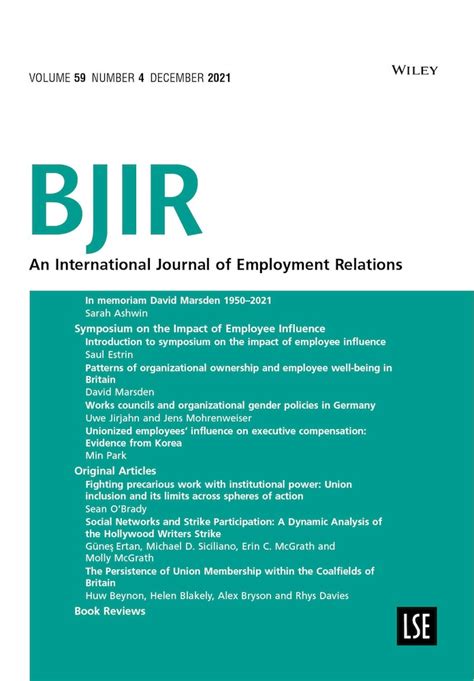
Works Councils and Labour Productivity: Looking beyond the Mean
in: British Journal of Industrial Relations, No. 2, 2015
Abstract
After more than 25 years of empirical investigation, the analysis of works council effects on establishment productivity is still an active field of economic research. I present first evidence for works council regression coefficients along the unconditional log labour productivity distribution in Germany. The highest (lowest) coefficients were found at the bottom (top) of the distribution, which suggests that works councils have the most beneficial effects at low levels of productivity. Importantly, coefficients are positive at each productivity level. The results shed light on a classical theoretical argument concerning moderating factors for the productivity effect of employee participation.
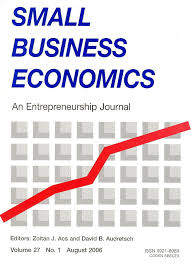
Economic Failure and the Role of Plant Age and Size
in: Small Business Economics, No. 3, 2015
Abstract
This paper introduces a large-scale administrative panel data set on corporate bankruptcy in Germany that allows for an econometric analysis of involuntary exits where previous studies mixed voluntary and involuntary exits. Approximately 83 % of all bankruptcies occur in plants with not more than 10 employees, and 61 % of all bankrupt plants are not older than 5 years. The descriptive statistics and regression analysis indicate substantial negative age dependence with respect to bankruptcy risk but confirm negative size dependence for mature plants only. Our results corroborate hypotheses stressing increasing capabilities and positional advantage, both predicting negative age dependence with respect to bankruptcy risk due to productivity improvements. The results are not consistent with the theories explaining age dependence via imprinting or structural inertia.
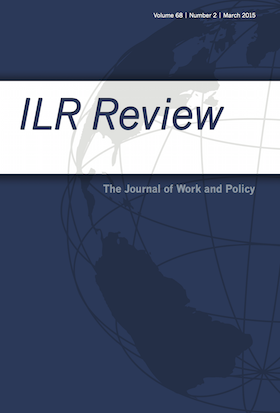
Is There Monopsonistic Discrimination against Immigrants?
in: ILR Review, No. 3, 2015
Abstract
The authors investigate immigrants’ and natives’ labor supply to the firm within an estimation approach based on a dynamic monopsony framework. Applying duration models that account for unobserved worker heterogeneity to a large administrative employer–employee data set for Germany, they find that immigrants supply labor less elastically to firms than do natives. Under monopsonistic wage setting, the estimated elasticity differential predicts a 7.7 log points wage penalty for immigrants thereby accounting for the entire unexplained native–immigrant wage differential of 5.8 to 8.2 log points. When further distinguishing immigrant groups differing in their time spent in the German labor market, their immigration cohort, and their age at entry, the authors find that the observed unexplained wage differential is larger for those groups that show a larger elasticity differential relative to natives. These findings not only suggest that search frictions are a likely cause of employers’ more pronounced monopsony power over their immigrant workers but also imply that employers profit from discriminating against immigrants.
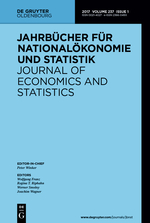
Intergenerational Transmission of Unemployment - Evidence for German Sons
in: Jahrbücher für Nationalökonomie und Statistik, No. 4, 2015
Abstract
This paper studies the association between the unemployment experience of fathers and their sons. Based on German survey data that cover the last decades we find significant positive correlations. Using instrumental variables estimation and the Gottschalk (1996) method we investigate to what extent fathers' unemployment is causal for offsprings' employment outcomes. In agreement with most of the small international literature we do not find a positive causal effect for intergenerational unemployment transmission. This outcome is robust to alternative data structures and to tests at the intensive and extensive margin of unemployment.
Working Papers
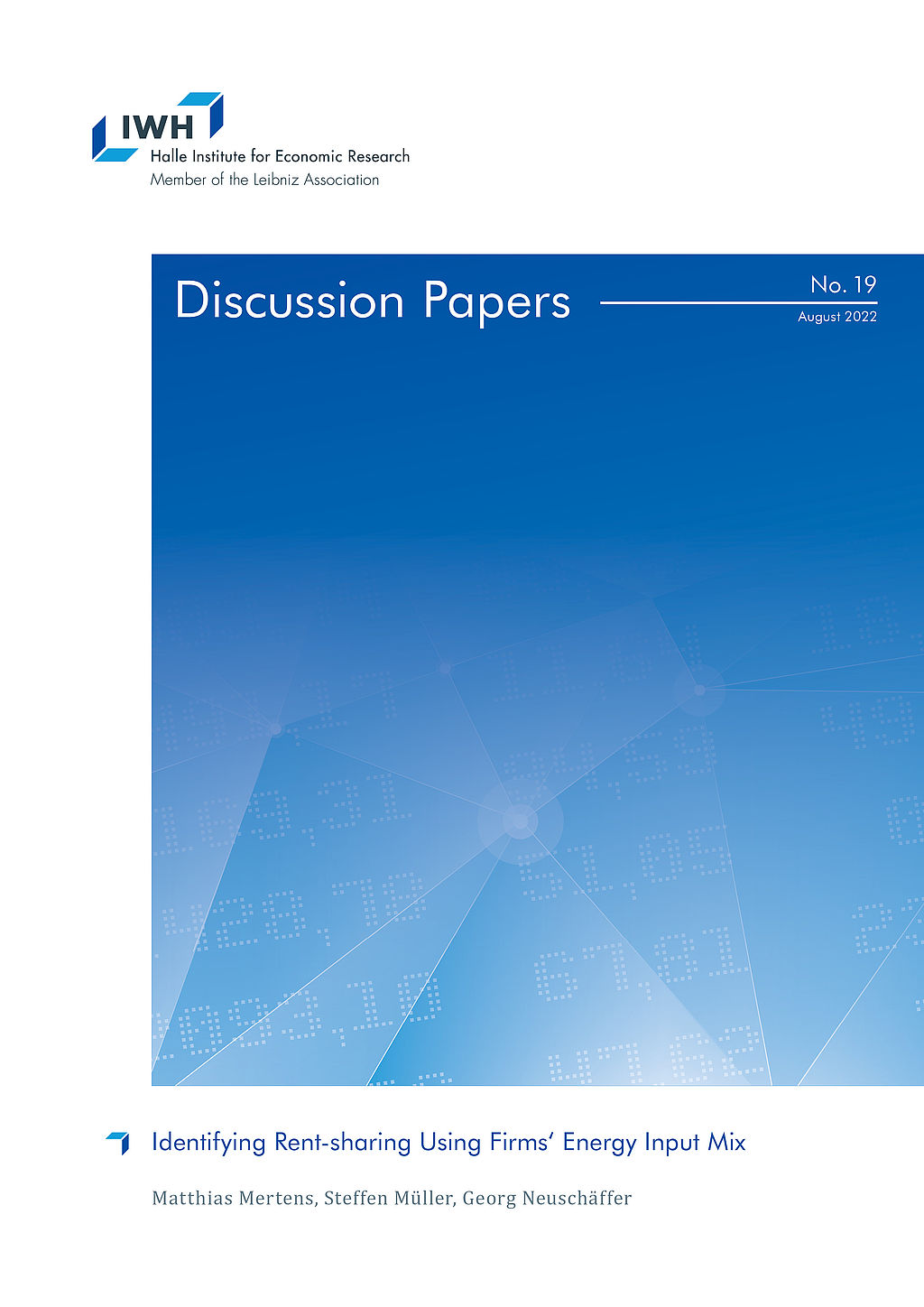
Identifying Rent-sharing Using Firms‘ Energy Input Mix
in: IWH Discussion Papers, No. 19, 2022
Abstract
We present causal evidence on the rent-sharing elasticity of German manufacturing firms. We develop a new firm-level Bartik instrument for firm rents that combines the firms‘ predetermined energy input mix with national energy carrier price changes. Reduced-form evidence shows that higher energy prices depress wages. Instrumental variable estimation yields a rent-sharing elasticity of approximately 0.20. Rent-sharing induced by energy price variation is asymmetric and driven by energy price increases, implying that workers do not benefit from energy price reductions but are harmed by price increases. The rent-sharing elasticity is substantially larger in small (0.26) than in large (0.17) firms.
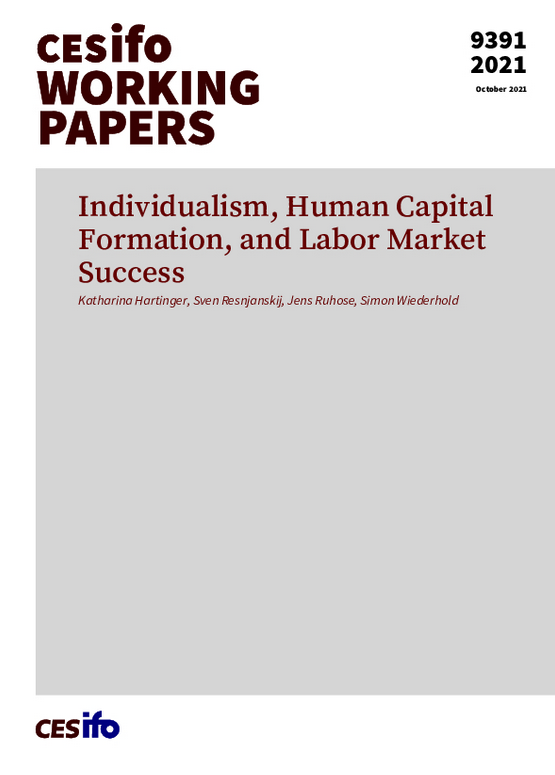
Individualism, Human Capital Formation, and Labor Market Success
in: CESifo Working Paper, No. 9391, 2021
Abstract
There is an ongoing debate about the economic effects of individualism. We establish that individualism leads to better educational and labor market outcomes. Using data from the largest international adult skill assessment, we identify the effects of individualism by exploiting variation between migrants at the origin country, origin language, and person level. Migrants from more individualistic cultures have higher cognitive skills and larger skill gains over time. They also invest more in their skills over the life-cycle, as they acquire more years of schooling and are more likely to participate in adult education activities. In fact, individualism is more important in explaining adult skill formation than any other cultural trait that has been emphasized in previous literature. In the labor market, more individualistic migrants earn higher wages and are less often unemployed. We show that our results cannot be explained by selective migration or omitted origin-country variables.
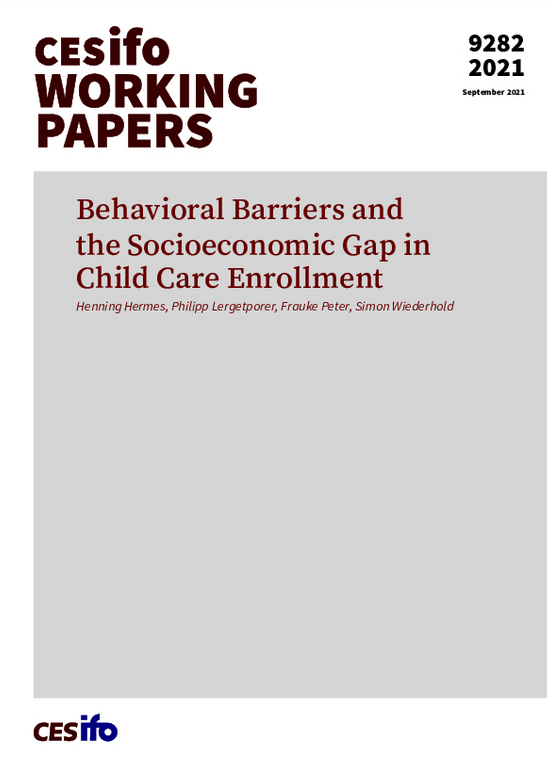
Behavioral Barriers and the Socioeconomic Gap in Child Care Enrollment
in: CESifo Working Paper, No. 9282, 2021
Abstract
Children with lower socioeconomic status (SES) tend to benefit more from early child care, but are substantially less likely to be enrolled. We study whether reducing behavioral barriers in the application process increases enrollment in child care for lower-SES children. In our RCT in Germany with highly subsidized child care (n > 600), treated families receive application information and personal assistance for applications. For lower-SES families, the treatment increases child care application rates by 21 pp and enrollment rates by 16 pp. Higher-SES families are not affected by the treatment. Thus, alleviating behavioral barriers closes half of the SES gap in early child care enrollment.
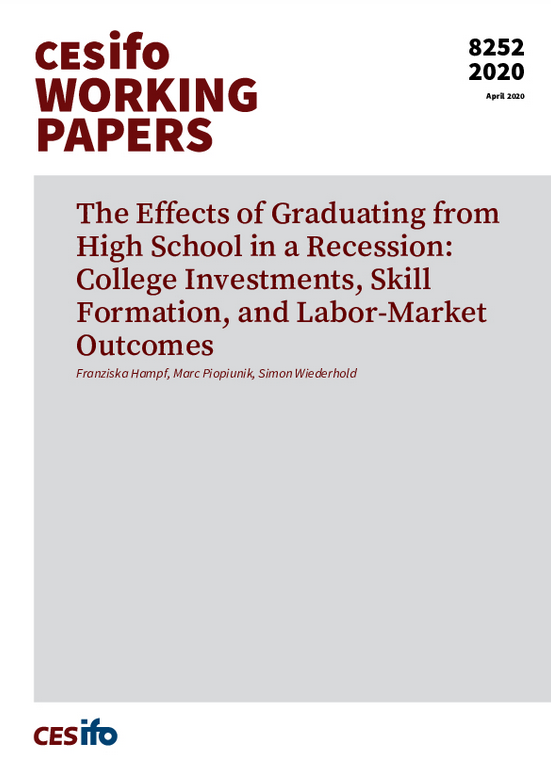
The Effects of Graduating from High School in a Recession: College Investments, Skill Formation, and Labor-Market Outcomes
in: CESifo Working Paper, No. 8252, 2020
Abstract
We investigate the short- and long-term effects of economic conditions at high-school graduation as a source of exogenous variation in the labor-market opportunities of potential college entrants. Exploiting business cycle fluctuations across birth cohorts for 28 developed countries, we find that bad economic conditions at high-school graduation increase college enrollment and graduation. They also affect outcomes in later life, increasing cognitive skills and improving labor-market success. Outcomes are affected only by the economic conditions at high-school graduation, but not by those during earlier or later years. Recessions at high-school graduation narrow the gender gaps in numeracy skills and labor-market success.

Identifying Bankruptcies in German Social Security Data
in: FDZ-Methodenreport, No. 10, 2017
Abstract
Many empirical studies about firm exits point out that it is important to distinguish between different types of closures, e.g., voluntary and involuntary liquidations. This report describes how exits due to bankruptcies can be identified in the German Establishment History Panel (BHP). In contrast to other closures, bankruptcies can be unambiguously regarded as indica-tion for economic failure and can therefore be interpreted as involuntary exits.


















